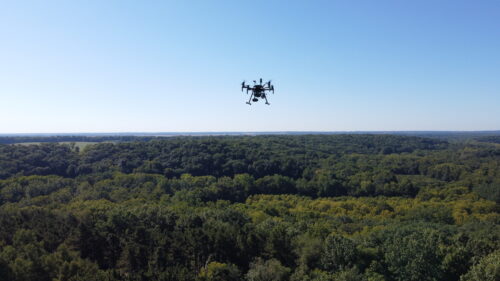 Purdue University - Extension - Forestry and Natural Resources
Purdue University - Extension - Forestry and Natural Resources
Got Nature? Blog
Purdue College of Agriculture News: Purdue University has received $12 million of a $35 million project led by the American Forest Foundation and funded by the U.S. Department of Agriculture’s Partnership for Climate Smart Commodities to help family forest owners practice climate-smart forestry in Indiana and eight other states throughout the eastern half of the U.S.
The project’s other partners are The Nature Conservancy, the Center for Heirs Property Preservation, and Women Owning Woodlands. The project could sequester an estimated 4.9 million tons of atmospheric carbon—a greenhouse gas that affects climate—over a 20- to 30-year period.
“Our digital forestry group has been working on various tools and thinking about how to apply these tools to real-life problems,” said Songlin Fei, who directs Purdue’s Integrated Digital Forestry Initiative. “This is an opportunity to apply our expertise to solving part of the climate-change puzzle.” Purdue’s cross-disciplinary Integrated Digital Forestry Initiative includes faculty members from the colleges of Agriculture, Engineering, Sciences, Liberal Arts and Libraries and the Polytechnic Institute. The Integrated Digital Forestry Initiative, one of the five strategic investments in Purdue’s Next Moves, leverages digital technology and multidisciplinary expertise to measure, monitor and manage urban and rural forests to maximize social, economic and ecological benefits. “We’re bringing a traditional field into the digital age,” said Fei, professor, Forestry and Natural Resources, and Dean’s Chair of Remote Sensing.
Purdue will utilize advanced digital forestry technologies to do the measurement, monitoring, reporting and verification of carbon sequestrations that the project requires. The automated technology, applied at a regional scale with unprecedented accuracy, will be based on data collected by satellites and drones with various sensors, such as light detection and ranging (LiDAR). The team will also develop a simulation system that will utilize artificial intelligence to generate optimized forest management scenarios.
The work will result in a web-based tool that landowners can use to estimate and predict the climate-smart commodity market potential of their properties. The team is also building a smartphone-based app for tree measurement and monitoring.
American families own nearly 40 percent of the nation’s forests, yet few of them take part in forest carbon projects or work from a management plan. However, with proper management, trees can grow faster and sequester more carbon, Fei said.
Landowners will receive economic incentives for participating in the program. Payment to landowners will depend on which climate-smart carbon practices they use. Project staff or consulting foresters will also provide landowners technical advice and guidance in establishing a forest management plan.
Resources:
Timber Harvesting and Logging Practices for Private Woodlands, The Education Store, Purdue Extension’s resource center
Investing in Indiana Woodlands, The Education Store
Marketing Timber, The Education Store
Woodland Wildlife Management, The Education Store
A Landowner’s Guide to Sustainable Forestry: Part 3: Keeping Your Forest Healthy and Productive, The Education Store
Investing in Indiana Woodlands, The Education Store
ID That Tree, Playlist, Purdue Extension – Forestry & Natural Resources (FNR) YouTube Channel
Woodland Stewardship for Landowners Video Series, Playlist, Purdue Extension – FNR YouTube Channel

Recent Posts
- Announcing-New Indiana Woodland Steward Newsletter
Posted: December 19, 2024 in Forestry, Timber Marketing, Wildlife, Woodlands - Red in Winter – What Are Those Red Fruits I See?
Posted: December 18, 2024 in Forestry, Plants, Urban Forestry, Wildlife, Woodlands - ID That Tree: Prickly Ash
Posted: December 16, 2024 in Forestry, Forests and Street Trees, Urban Forestry, Wildlife - Tips on How You Can Recycle Your Christmas Tree
Posted: in Ask the Expert, Christmas Trees, Forestry, Forests and Street Trees, How To, Wildlife - Hardwood Tree Improvement Regeneration Center (HTIRC) Shares Fall Newsletter, Research and Outreach
Posted: December 13, 2024 in Forestry, Land Use, Natural Resource Planning, Woodlands - Ask An Expert: Holidays in the Wild
Posted: December 9, 2024 in Christmas Trees, Forestry, Forests and Street Trees, How To, Plants, Wildlife, Woodlands - Venison Workshops Help Hunters to Safely Process Deer – ANR
Posted: December 4, 2024 in Forestry, Wildlife, Woodlands - Selecting a Real Christmas Tree
Posted: November 26, 2024 in Christmas Trees, Forestry, How To - Woodland Management Moment: Maintaining Some Open Cover
Posted: November 13, 2024 in Forestry, Urban Forestry, Wildlife, Woodland Management Moment - Help Feed Hungry Hoosiers- MyDNR
Posted: in Community Development, Forestry, How To, Wildlife
Archives
Categories
- Alert
- Aquaculture/Fish
- Aquatic/Aquaculture Resources
- Ask the Expert
- Christmas Trees
- Community Development
- Disease
- Drought
- Forestry
- Forests and Street Trees
- Gardening
- Got Nature for Kids
- Great Lakes
- How To
- Invasive Animal Species
- Invasive Insects
- Invasive Plant Species
- Land Use
- Natural Resource Planning
- Nature of Teaching
- Plants
- Podcasts
- Ponds
- Publication
- Safety
- Spiders
- Timber Marketing
- Uncategorized
- Urban Forestry
- Webinar
- Wildlife
- Wood Products/Manufacturing
- Woodland Management Moment
- Woodlands